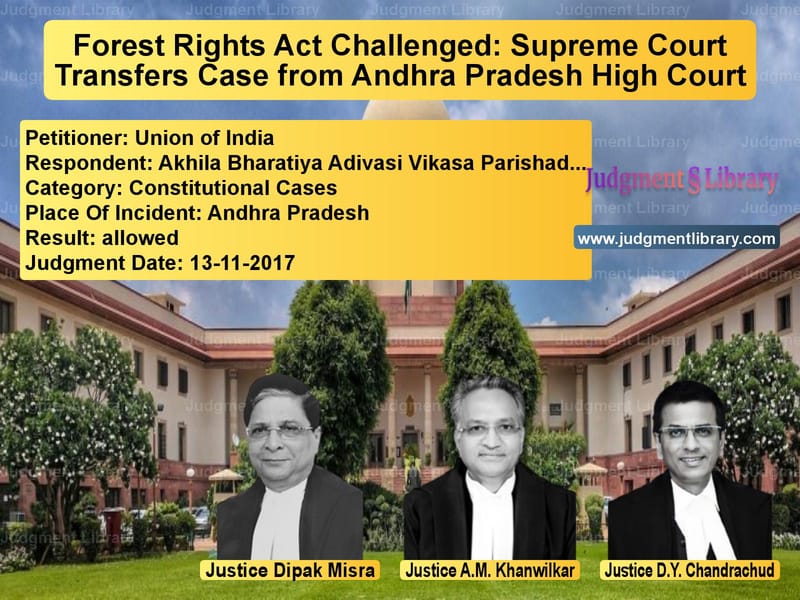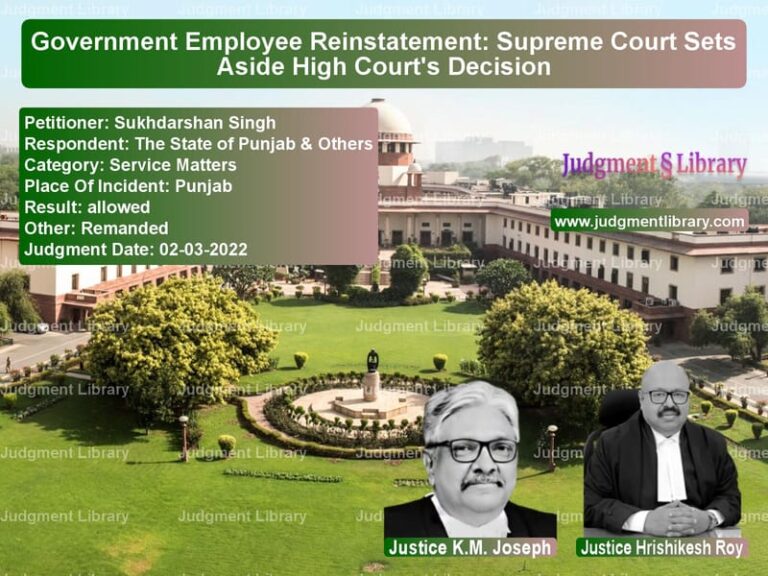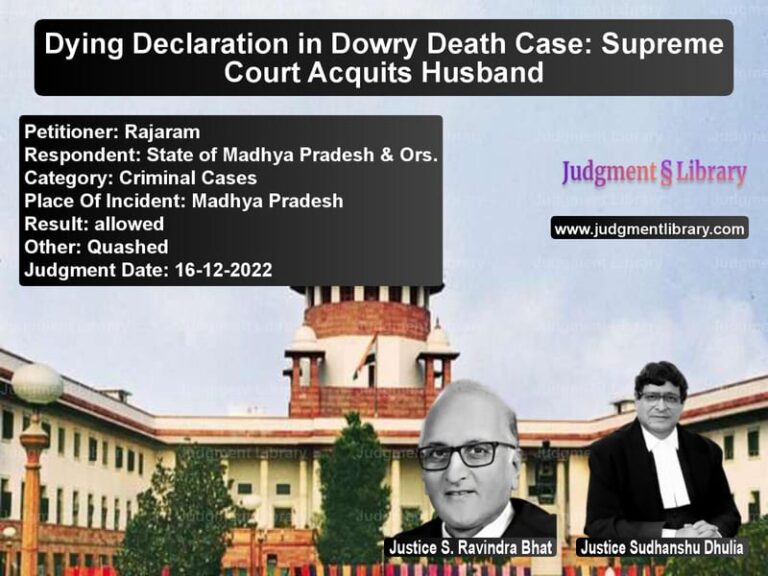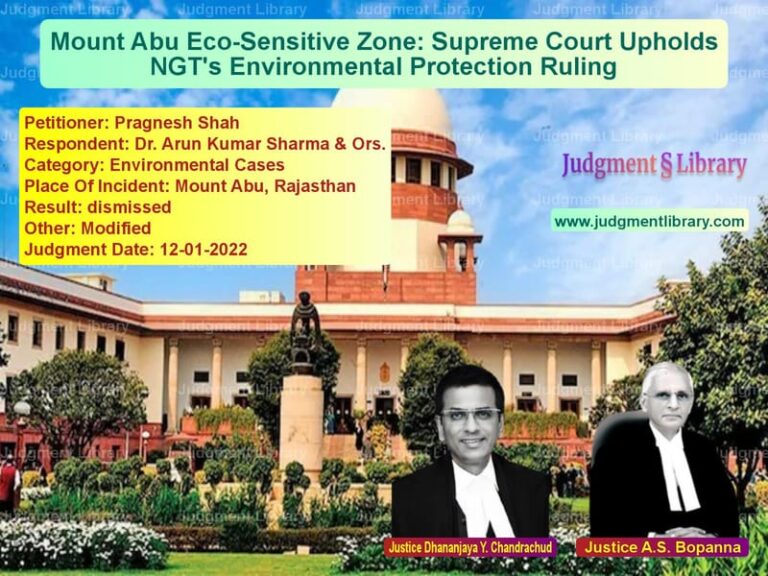Forest Rights Act Challenged: Supreme Court Transfers Case from Andhra Pradesh High Court
The Scheduled Tribes and Other Traditional Forest Dwellers (Recognition of Forest Rights) Act, 2006 (commonly known as the Forest Rights Act (FRA)) has been a subject of legal disputes since its enactment. Designed to recognize and protect the land and forest rights of indigenous and traditional forest-dwelling communities, the Act has faced opposition from various groups challenging its constitutional validity.
One such challenge was filed in the Andhra Pradesh High Court as Writ Petition (Civil) No. 15798 of 2009. Meanwhile, a similar challenge was already pending before the Supreme Court under Writ Petition (Civil) No. 50 of 2008. The Union of India, concerned about parallel proceedings leading to conflicting rulings, sought the transfer of the case from the Andhra Pradesh High Court to the Supreme Court under Article 139(A) of the Constitution.
The Supreme Court, in its judgment, granted the transfer petition and directed that all proceedings before the Andhra Pradesh High Court be moved to the Supreme Court to ensure consistency in adjudicating the matter.
Background of the Case
The Forest Rights Act was enacted in 2006 to provide legal recognition to the rights of traditional forest-dwelling communities over land and other resources. Before the enactment of this law, many such communities faced eviction from their ancestral lands due to conservation policies that did not recognize their claims.
However, several stakeholders, including environmental groups and state governments, raised concerns regarding the Act’s impact on forest conservation and its alleged encroachment on state land policies. The Andhra Pradesh High Court petition challenged the validity of the Act on these grounds.
Simultaneously, another case challenging the constitutionality of the Act was filed in the Supreme Court under Writ Petition (Civil) No. 50 of 2008. Since both petitions dealt with the same issue, the Union of India moved the Supreme Court for a transfer of the Andhra Pradesh case.
Legal Issues Before the Supreme Court
The Supreme Court was asked to determine:
- Whether allowing multiple High Courts to decide on the same constitutional issue could lead to conflicting judgments.
- Whether transferring the case to the Supreme Court would ensure judicial consistency.
- Whether the Forest Rights Act had constitutional backing.
Arguments by the Union of India
The Union of India, represented by Additional Solicitor General Pinky Anand, argued that:
- The Forest Rights Act’s constitutional validity was already under review in the Supreme Court under Article 32.
- Having multiple courts rule on the same central legislation could lead to contradictory interpretations.
- The Act affected millions of forest dwellers, and it was necessary for the highest court to decide the issue conclusively.
- A stay had already been granted on the Andhra Pradesh High Court proceedings.
Arguments by the Respondents
The respondents, representing various Adivasi and forest-dwelling communities, argued that:
- The Forest Rights Act was essential for protecting the rights of indigenous people who had historically been marginalized.
- Transferring the case to the Supreme Court would delay justice for communities awaiting legal recognition of their land rights.
- Any ruling must take into account the livelihood concerns of millions of people dependent on forest resources.
Supreme Court’s Observations
The Supreme Court carefully considered the issues and noted that:
- Since the same central law was being challenged in multiple courts, it was appropriate for the Supreme Court to hear the matter to avoid inconsistency in legal interpretation.
- The Court had jurisdiction under Article 139(A) to transfer such cases in the interest of judicial efficiency.
- The validity of the Forest Rights Act involved fundamental constitutional questions that required a definitive ruling.
The Supreme Court observed:
“Since a substantive Writ Petition under Article 32 is pending before this Court where the vires of the same central statute is in issue, we accede to the prayer for transfer of the proceedings pending before the High Court to this Court.”
Final Judgment
The Supreme Court ruled in favor of the Union of India and directed:
- The transfer of Writ Petition (Civil) No. 15798 of 2009 from the Andhra Pradesh High Court to the Supreme Court.
- The registry to ensure that all case papers and records were transmitted to the Supreme Court at the earliest.
- The matter to be heard along with Writ Petition (Civil) No. 50 of 2008, already pending before the Supreme Court.
The Supreme Court disposed of the transfer petition and maintained the stay on further proceedings in the Andhra Pradesh High Court.
Significance of the Ruling
The Supreme Court’s decision to consolidate cases challenging the Forest Rights Act ensures:
- Uniformity in legal interpretation across states.
- Avoidance of conflicting High Court rulings.
- Efficient adjudication of a matter affecting millions of indigenous forest dwellers.
Potential Implications
The ruling has significant implications:
- If the Supreme Court upholds the Act, it will solidify the rights of forest-dwelling communities across India.
- If the Court strikes down any provisions of the Act, it may lead to large-scale legal disputes over land rights.
- The decision will set a precedent for handling similar constitutional challenges in the future.
Conclusion
This case underscores the Supreme Court’s role in ensuring consistency in the application of constitutional law. By consolidating cases related to the Forest Rights Act, the Court aims to provide clarity on a law that impacts millions of forest dwellers and tribal communities. The judgment ensures that fundamental rights are upheld while balancing the concerns of conservationists and state governments.
Don’t miss out on the full details! Download the complete judgment in PDF format below and gain valuable insights instantly!
Download Judgment: Union of India vs Akhila Bharatiya Adi Supreme Court of India Judgment Dated 13-11-2017.pdf
Direct Downlaod Judgment: Direct downlaod this Judgment
See all petitions in Fundamental Rights
See all petitions in Constitution Interpretation
See all petitions in Public Interest Litigation
See all petitions in Judgment by Dipak Misra
See all petitions in Judgment by A M Khanwilkar
See all petitions in Judgment by Dhananjaya Y Chandrachud
See all petitions in allowed
See all petitions in supreme court of India judgments November 2017
See all petitions in 2017 judgments
See all posts in Constitutional Cases Category
See all allowed petitions in Constitutional Cases Category
See all Dismissed petitions in Constitutional Cases Category
See all partially allowed petitions in Constitutional Cases Category







